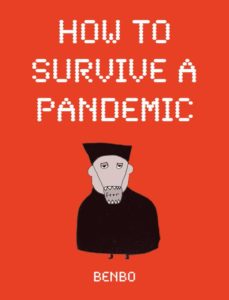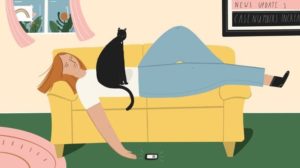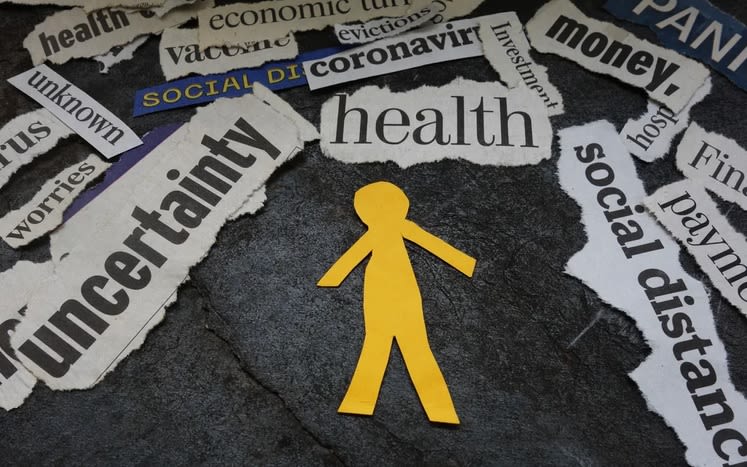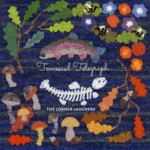Following the outbreak of Coronavirus and then three months of Lockdown, how are you feeling? How is your head? Isolation, uncertain times, invisible threats, the extra pressures financial or emotional are triggers for those with anxiety and depression. It’s even worse for those with children who now have to home-school as well as work or those who have lost their jobs. These are very real pressures that can affect mental health too.
I have been managing my mental health issues for nearly twenty years now. Over the first few weeks of lockdown I was coping ok. I work from home anyway so it meant my leisure and social time was cut down and there was an upsetting inability to see loved ones. However, despite all this I was coping ok, I even started a podcast which was fun. But a few weeks ago things took a turn for the worse, my mood and mentality taking a battering. It became tiring to be restricted to only the local park for my one daily exercise, massively wearing and hard not being able to see people that I cared about; to have contact with them. This along with the dispiriting tidal wave of depressing news, daily infections and death figures clocking up, plus the frustrating political response, it began to affect my mood badly and my anxiety levels became raised; my mood was on the floor; I was sleeping all of the time.
A few weeks ago I woke in the early hours to a terrible and terrifying panic attack triggered by a bad stomach. I have intermittently been suffering with anxiety, low mood and fatigue. All of this made me look into how to help myself but also wonder how others are coping with being cut off and isolated in and restricted to their own home or area, so as lockdown begins to ease here is what I found.
The Guardian have reported that one in four youths with mental health issues haven’t been able to get help during lockdown.
It’s not just those with existing of mental health issues who have been presenting with issues arising from a swirl of impacts of lockdown, from the isolation and claustrophobia of being home all the time, substance misuse, the effects of unemployment and the stress of an uncertain financial situation, plus the very real grieving process for those losing loved ones to the virus.
A recent survey undertaken with psychiatrists across the UK revealed that families were experiencing significant tension as a result of staying at home together all the time. Four in 10 psychiatrists report an increase in people needing urgent and emergency mental healthcare – including new patients – in the wake of the lockdown.
The chief executive of one mental health trust said: “We are definitely seeing ‘people not known to services’ who are acutely unwell. They are mainly young men aged 18-25 who require admission. Misuse of alcohol and drugs is a factor – people who normally smoke a bit of weed smoking more than usual in their rooms. People not working is also an issue.
“One woman rang us recently and said her partner was walking around their house like a zombie because he wasn’t working and couldn’t provide for the family and had just snapped.”
Dr. Kate Lovett, Dean of Royal College of Psychiatrists, said: “During the pandemic, people are presenting for the first time with symptoms of serious mood disorders, such as mania, significant depression, and psychotic episodes. These have been triggered by significant stress and life events associated with the pandemic and the lockdown.
“I and other colleagues have seen people presenting for the first time in emergency situations, often triggered by significant life events such as losing a job, a bereavement, significant illness in a family member or concerns that their business, or the one they work for, is about to go under.”
Lovett, a community psychiatrist in Devon, added: “Of the people I am seeing, many are extremely unwell with symptoms of severe mental illness: serious changes in their moods, belief system and hallucinations. Life events associated with Covid-19 have triggered this or led to a relapse for almost all of them. Relationships are now all feeling lockdown pressures. Routines have disappeared.”
According to a survey of UK adults which took place during lockdown (2 – 3 April) and reported upon by a mental health website, almost one in four (24%) said they had feelings of loneliness in the “previous two weeks”. When the same question was asked shortly before lockdown, just one in ten people (10%) said they had these feelings. In just a few weeks, social distancing left millions more people in the UK feeling isolated.
Long-term loneliness is associated with an increased risk of certain mental health problems, including depression and anxiety. The impact of long-term loneliness on mental health can be very hard to manage and content with.
Faye Rogers of one of our favourite Cardiff bands, Rosehip Teahouse tells us about how she has been managing in lockdown:
“I must admit, lockdown has been quite a struggle for me in terms of my mental health. I know that a lot of people must be really struggling, as I think whether you realise it or not at the time, general routine and support systems are so important in terms of recovery and staying well.”
“I’m incredibly fortunate to normally receive a lot of help from my mental health teams. Out of lockdown, I have sessions with mental health professionals several times a week but sadly, all of these services have been halted due to coronavirus and the lock-down. I thought I was doing well before it all happened, but the sudden influx of empty time at home with my own thoughts has been incredibly challenging for me. I found myself relapsing with eating disordered behaviours that I thought I had overcome.”
“I found myself having disturbing intrusive thoughts and severe dissociative episodes. Suddenly getting out of bed and showering became so so much more difficult and I was struggling to cope with everything that was going on. I think that distractions, being able to go out in the community and see friends, going to work and also playing shows, having band practice, everything like that were really important protective factors for me in keeping well and focusing on recovery and suddenly all of these things felt like they were never coming back. I’m trying my best to reach out to people, but mental illness likes to work in mysterious ways and I sometimes find myself thinking ‘people don’t want to hear from me, no-one is going to want to see me when lock-down is over, my support will never return, I am bringing my housemates down, i shouldn’t be here anymore.”
“I’m INCREDIBLY lucky to live with two unbelievably supportive people who have been really really helping me through this time and due to some of my relapsing behaviours, I am now receiving weekly telephone support from my mental health teams. But this is so so different from accessing support in person. For me, taking my dog out for walks, making dinner with my housemates and taking part in music live-streams has been pretty life-saving for me. I’ve also been able to record a new EP from home which was an amazing thing for me to be able to focus on and feel positive about which has helped me to remember that there is a world outside of this epidemic and that it will return at some point.”
I know there are also extra services being added to charities that can help, such as the ‘Beat’ helpline for people suffering with eating disorders (0808 801 0677) and there is also a Wales crisis helpline that people may not know about called ‘C.A.L.L’ which you can ring or text when in a crisis (0800 132 737 // 81066 for text). It’s run by mental health professionals in Wales and is open 24/7 and is an amazing resource. I really urge people to reach out to these points of support when struggling. It’s a really hard time, but it’s important to remind yourself of the hope that is still out there and that the life that keeps you well will return. I hope people are doing okay and looking after themselves as much as possible. We’ll get through this!!!”
One of our writers and a key worker in the NHS, Nathan O’Hagan tells us of his experiences “I’ve often hypothesised that, when you live in a state of perpetual anxiety, perversely it can sometimes offer a layer of protection when something genuinely anxiety inducing happens, compared to if you were permanently relaxed. You’re already on your toes to some extent, always expecting something bad to happen, so when it does, at least you were prepared for some level of the emotional impact, if not for specifically for the event itself it. For the first few weeks of the covid-19 pandemic, I felt like I’d been proved right, as my anxiety levels didn’t increase all that much.
It proved only to be a fragile and temporary defence.
For the last few weeks, any comfort I may have been taking in this has gradually evaporated. I’ve been struggling with insomnia, my concentration levels are pretty much zero, and, while I’m trying to focus on the unexpected positive aspects of lockdown – increased time with family being the main one – there have been frequent feelings of hopelessness, of being overwhelmed by the magnitude of the death, the suffering and the uncertainty.”
The artist and musician Benbo who has just produced a animated book called ‘How to survive a pandemic‘, explained his own experiences: “For me it isn’t really only about lockdown – pre-lockdown was an anxiety shitshow because of worrying about getting ill or passing on COVID-19 to vulnerable people. Lockdown was quite a big relief initially because of that. By this point though, we’ve been deprived of choices about how we spend our time for so long it’s started to become depressing. For me personally there are four things I do to keep mentally healthy – help/look after people, work for money, work on music and art, and get a change of scene. Looking after kids is great for routine but it’s also massively disruptive to being able to focus. Working for money is disrupted because of furlough and kids.”
“Working on music is impossible because I have no studio space at the moment. Working on art is barely possible during the day because of kids – so it’s only after bedtimes. Definitely possible short term – I made a book out of existing drawings over 2/3 weeks, out now £3.99! – but takes its toll on sleep, which has its own consequences. Getting a change of scene is hard with kids, especially when you’re on childcare duties. So the impact of that is cumulative, and when you add the growing unease about how government is going to support vulnerable people over the next few years, anxiety levels are rising again too – this is more about the Westminster government than Scotland, where the messaging has been much more consistent and solid and the culture is better for public services anyway. Right now we are 9/10 weeks in and I’m saying hello to some feelings of dread and uselessness that haven’t been part of my life for some time.”

Richard Stone from A Blue Flame explains how lockdown has affected his state of mind. “Everything’s slower and faster at the same time. I’m finding it harder to get going and it takes longer than normal to get tasks done but then suddenly the day’s gone.
It’s harder to get to sleep than usual and I’m waking up frequently in the night. Being outside, doing something physical seems to be the best activity to help me stay focused. Hardly anyone wants to say how hard it’s been until you say it first and then that’s all they want to talk about. It’s like people need permission to admit they’re stressed – stuff upper lip syndrome, maybe… The words I’ve heard most about the situation are mad, weird and strange.”
Songwriter Johnno Casson aka Snippet tells us about the factors that influence his state of mind “My mental health depends on 3 things above all else – love, people and the outdoors/nature. Covid-19 has had a massive impact on that, luckily love has been a constant but interacting with people in a positive, joyful way face to face way is now impossible so I have done what I have learnt to do for 10 years since I first became unwell – when mental health or medical conditions start to bite down hard – go meet the people online, it’s not as rich as engaging in person of course but for me it can be just as strong in a different way and can have an amazingly good effect on my mental health. I surround myself with good people and we share similar interests and a sense of humour (a really big key), being silly and escaping into this world brings rich rewards. Hey!”
“As a recording artist I worked with my late producer for 9 years without ever meeting in person, me in England, him in The Netherlands and to be honest, it was one of the great friendships and relationships of my life. The other thing is being outdoors, that was very tricky to start with but I got lucky Why? How? 1. I have a garden, and it never felt more important to have it than it does now 2. I have a dog, he needs to be walked. Although i was very hesitant initially, I followed government advice and took him out for walks, smaller walks, no off the lead walks but walks all the same. And you will have no doubt heard this a thousand times – nature and the great outdoors have never felt as special as they do now, never have I been able to hear the birds sing like I have in lockdown, there is a special medicine in that. There are a couple of other things, if the doctor has given you medicine for depression – just keep taking it, never rush off anti depressants when things are stable for a few days or even a few weeks.”
Understand from the very beginning (or as soon as possible) that you will have good days but you also will have bad, and don’t panic when they come because they will almost certainly arrive. They are just a reminder that you need to practise being well with your mental health, you need to keep feeding it the good things that work for you and when you forget, just get back on the horse, keep breathing and a change (for the better) is always just around the corner. Oh and lastly – talk to people, even if just via dm, text or telephone, keep talking, keep going, keep practising if you are not used to it, you will get there and a chat will help.”
Mark Smith of Sixty Six / Ninety Nine(https://sixtysixninetynine.org/) an arts and media social enterprise, providing new solutions to suicide prevention and awareness, told us “I think living alone with bipolar disorder, has left me thinking of three things:
One – I’ve come this far in one piece, albeit with some difficult moments along the way.
Two – Trying to stay in the moment now. It’s tough, as I’ve naturally felt frustrated and trapped at times.
Three – We have to know that this is a long-term issue. It’s not suddenly going to go away overnight. As with my regular bad days, we need coping strategies.
Thankfully, work has kept me busy, but balancing with rest and recharging the batteries has not been straightforward. I’ve allowed my body-clock to go out of sync, which isn’t good for your mental health. I haven’t been out much at all but am used to cutting myself off from the world, just not for this length of time!
Lockdown has made me realise that things I wanted or needed in the past I simply don’t need at all. I’m still eating lots of the things I shouldn’t, but I’m not wasting anywhere near as much food as I was beforehand. All of this said, I am looking forward to that first hug with family and close friends. That first cuppa and laugh (and probably a cry) in their company.
Continued respect for those on the frontline and sympathy to those who have lost ones. Having not been in either position, I will be eternally grateful.”
Psychotherapist Tamsin Embleton has help produce an extremely useful helpbook for those suffering during lockdown it contains many tips for how to cope and identify potential triggers:
“One of the challenges of Covid-19 is that there is a threat but that the threat is hard to identify or detect as early symptoms are familiar and ordinary, hard to quantify (which can trigger fear of the unknown) and we’re unsure of when things will return to normal (leaving us with feelings of uncertainty). It can increase health anxiety and uncover death anxiety (which the existentialists would suggest is always present though not always in our conscious awareness).”
“Coronavirus and the consequent lockdown has disrupted the routines, plans and structures that bring shape to our lives and challenges our sense of being in control. It confronts us with our own limitations – which is a hard reality to face. The dust is yet to settle and we are collectively and individually still figuring out how to process and cope in the face of a pandemic.
Helping to identify what it is that you’re feeling and how you respond to stress will give you a clearer sense of what’s going on inside so that you can start to come to terms with what you’re experiencing and figure out the best way forward. Self-care, on the other hand, is quite literally taking care of yourself and meeting your own needs, with longer term goals in mind. We tend to learn (or not learn) the skills of how to take care of ourselves during childhood and adolescence. Self-care reduces the stress in your life, not just the stress occurring in the moment.
Self-care is:
+ Seeking care for physical or emotional difficulty
+ Exercising
+ Meditating
+ Getting enough good-quality sleep
+ Nourishing your body
+ Managing your finances (as much as you’re able to)
+ Engaging in community activities
+ Pursuing and maintaining healthy relationships (with appropriate boundaries and room for
both partner’s voices, needs and emotions).”

Lizzie Knott from Watford is a 22-year-old illustrator who lives with depression, she told the BBC: “For me, depression feels like my cat Rodney is sitting on my chest. He sits there for a few days and doesn’t move. He is noticeably heavy but not in a way that actively stops me from carrying on doing things – a bit like a baby in a sling. That’s because I have what’s known as high-functioning depression. But during those days something small can make me cry and feel really hopeless.
I have been waiting for my depression to spring up on me during this weird and turbulent time and this week it finally has.
The feeling of things being out of my control and being unable to escape a situation can make me feel quite anxious and depressed anyway, and I think the weight of this pandemic and how much my life has changed in just three weeks has suddenly hit.
Like a lot of people I have just been riding the waves of what’s happening in the world without really processing how I’m feeling about it, until now. I can’t apply for jobs or think about my future, or progressing my life, and that’s what scares me sometimes. I think “what is the point in anything I’m doing?.
My university days are suddenly over and I’ve had to move out of the house I rented with my three best friends – my support system. I was the only one who didn’t cry when we said goodbye to one another. I just felt a tingly numbness – fine, but artificially fine.
My depression stems from PTSD and will probably affect me for the rest of my life. But it is something I have learnt to fuel into positive artwork.
I hope when this pandemic passes my negative feelings about home will be replaced with positive, warm ones because we have all been supporting each other. I will look back on the board-game nights we had to help pass the time and the meals we ate together in the garden. My family are amazing and I’m lucky to be in a safe environment with them.
Since being in lockdown I’ve been drawing lots of flowers and light because it’s a reminder that spring is still blooming and the world is still going round. I see beauty in things I used to take for granted. I really look forward to the sunset now, when before I’d never have looked out for it because I’d be so busy with uni or work.
This lockdown has given me lots of time for self-reflection – my pace of life is slower now. But I know not everyone is as lucky. Most of my mind is taken up with thinking about the pandemic – only the important things are important now and the small things aren’t any more.”

One of the most powerful pieces of television during lockdown came in the shape of the film about Tony Slattery on the BBC, it detailed in vivid and graphic terms his fight for mental health diagnosis and treatment the impact of his drinking addiction upon his partner, plus the heartbreaking abuse he suffered as a young person that clearly affected his life. In one instructive scene his friend and fellow depression sufferer Stephen Fry described seeing depression as a thing or a feeling of pain you are detached from and this struck a chord with me, could I be an observer and could I be piling on guilt, shame, pressure onto my problems, could I be making them worse? Acknowledging this could be part of my mental health issues and could be the first step to acceptance and being open to treatment and therapy.
As we emerge from lockdown the effects of being stuck at home for months will still reverberate with many for some time. Some will suffer with PTSD or agoraphobia as they feel in the dark to assimilate again into some kind of normal society. As we ease lockdown the uncertainty of a different post Covid world and economy and the uncertainty of how different our lives will be, coupled with the still present threat of Covid-19, means mental health issues are something many of us will still have to manage every day. There needs to be more support and funding for mental health services. Maybe we can start by being more understanding, looking out for our friends, checking in on them and being respectful of those who still need a bit of space to recover from lockdown.
More information and support:




